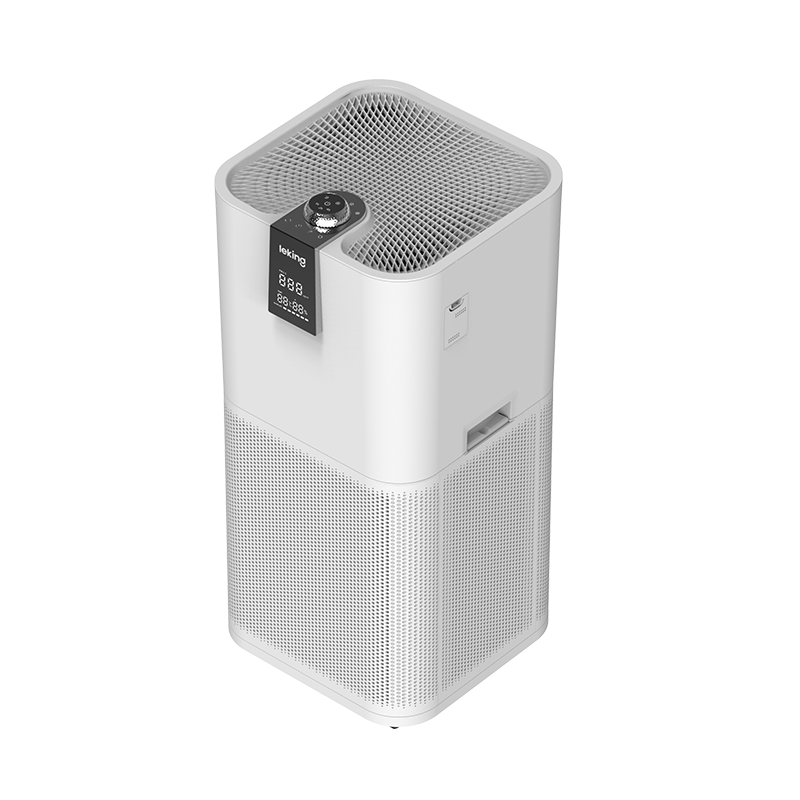A medical-grade air purifier is a device that efficiently filters harmful particles and pollutants in the air. This article will detail how a medical-grade air purifier works and the factors that go into evaluating whether it’s worth buying.
What makes an air purifier a medical-grade product?
Medical-grade air purifiers have higher filtration efficiency and more powerful purification capabilities than ordinary air purifiers. Here are the key features that make an air purifier a medical-grade product:
High-efficiency filtration system: Medical-grade air purifiers are equipped with a multi-layer filtration system, including primary-efficiency, medium-efficiency, high-efficiency filters, and activated carbon filters. These filters capture and remove airborne pollutants such as tiny particles, pollen, bacteria, viruses, and harmful gases.
HEPA Filtration Technology: HEPA (High-Efficiency Particulate Air) filters are one of the core components of medical-grade air purifiers. It can effectively filter out particles with a diameter of 0.3 microns, including bacteria and viruses. This filtration technology is widely used in settings such as hospitals, operating rooms, and laboratories.
Air quality sensor: Medical-grade air purifiers are usually equipped with air quality sensors that can monitor indoor air quality in real-time and automatically adjust the purifier's working mode to ensure that the air is always clean and healthy.
The working principle of a medical grade air purifier is based on the following steps:
Air intake: Air enters the purifier from the room.
Pre-filtration: Before entering the main filtration system, the air first passes through a pre-filter, which captures large particles such as dust and pet hair.
HEPA filtration: After pre-filtration, the air enters the HEPA filter. HEPA filters use a dense mesh of fibers to capture tiny particles such as pollen, bacteria, and viruses. The high efficiency of this filter is one of the keys to a medical-grade air purifier.
Activated carbon filtration: Some medical-grade air purifiers also come with activated carbon filters, which remove harmful gases and odors, providing cleaner air.
Air outlet: After being filtered and purified, the air is released from the air outlet into the room to keep the indoor air clean and healthy.
Is a medical-grade air purifier worth buying?
Medical-grade air purifiers are well worth buying for those who have very high requirements for air quality. In particular, the following groups of people would benefit from a medical-grade air purifier:
People with asthma or allergic reactions: Medical-grade air purifiers can filter pollen, dust mites, pet dander, and other allergens from the air to reduce the risk of allergy symptoms.
People with weakened immune systems: For people with weakened immune systems, such as the elderly, children, and individuals with chronic illnesses, medical-grade air purifiers can help reduce the risk of contracting germs and viruses, providing a cleaner and healthier indoor environment.
Healthcare facilities and laboratories: Medical-grade air purifiers are essential equipment in professional settings such as hospitals, operating rooms, and laboratories. They can effectively remove microorganisms and harmful particles from the air, protecting the health of medical staff and patients.
The value of medical-grade air purifiers
Although medical-grade air purifiers are more expensive, they are well worth buying for certain groups of people. Here are some factors to assess its value:
Filtration efficiency: Medical-grade air purifiers have higher filtration efficiency, can capture smaller particles and bacteria, and provide cleaner air quality.
Air quality monitoring: Medical-grade air purifiers are usually equipped with air quality sensors that can monitor indoor air quality in real-time and automatically adjust the purifier's working mode. This ensures the air remains clean and healthy at all times.
Adaptability and reliability: Medical-grade air purifiers have undergone rigorous testing and certification, have higher reliability and adaptability, and can maintain stable performance over long periods of operation.
Best Medical Grade Air Purifier
There are many medical-grade air purifier brands and models available on the market. The best medical-grade air purifier depends on personal needs and budget. The following are highly recommended brands:
leking P550: This air purifier from Leking uses seven-layer filtration technology, which can intercept 99.9% of aerosols and small particles of 0.1μm-10μm that carry bacterial pathogens. It can effectively filter PM2.5, bacteria, viruses and other inhaled particulate matter. Multi-fold HEPA filter paper has a larger filtration area and can effectively reduce wind resistance and allow rapid air circulation.
It is a medical-grade air purifier trusted by hospitals!
Medical-grade air purifiers can effectively remove harmful particles and pollutants in the air through efficient filtration systems and advanced technology. For people who have high requirements for air quality, a medical-grade air purifier is a device worth buying. When choosing, you need to consider filtration efficiency,



